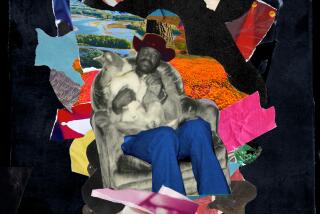AN APPRECIATION : Dorsey’s Gospel Music Gave the Devil His Due
- Share via
Like most obituaries, the death notice for Thomas A. Dorsey offered a lot of facts but told little of the life behind them. It said that he was the father of gospel music; that he had written numerous hymns, including “Sweet Bye and Bye,” “Peace in the Valley” and “Take My Hand, Precious Lord,” and that he was 93 when he died, of complications of Alzheimer’s disease, in Chicago on Saturday.
All that is true, as far as it goes. But it really doesn’t go far enough. Because as much as Dorsey’s life testified to the power of faith and the promise of salvation, it also seemed to prove that the real difference between the devil’s music and the Lord’s is not a matter of notes, but of inspiration.
Dorsey, after all, knew the devil’s music intimately. True, he was born into a Christian household in Villa Rica, Ga. The son of a Baptist minister, he grew up on the hymns of Isaac Watts and counted hearing Homer Rodeheaver at a Billy Sunday revival in Atlanta as one of the most memorable experiences of his youth.
Nonetheless, the young Dorsey made his living playing blues piano. Known first as Barrelhouse Tommy, he cut his teeth in bars and bordellos before moving on to the vaudeville circuit, where he became “Georgia Tom,” writing and playing for stars like Ma Rainey and Trixie Smith.
But Dorsey didn’t truly make his mark until he hooked up with another Georgian, guitarist Tampa Red. Working and recording as the Hokum Boys, Tampa Red and Georgia Tom churned out a steady stream of risque blues, finally hitting the big time in 1928 with a million-selling recording of a Dorsey tune, “It’s Tight Like That.”
Although its suggestive lyrics seem quite mild by modern standards, “Tight Like That” was a scandal in its time and was blamed by no less than W.C. Handy for inspiring “a flock of lowdown, dirty blues.”
Dorsey doubtless would have continued in this vein had he not fallen ill and, after the death of a neighbor, been moved to write his first religious song, “If You See My Savior, Tell Him That You Saw Me.” It was hardly an immediate success; it was three years before he sold even a single copy of the song, during which time he kept up his career in the blues. But it became the hit of the Jubilee Session of the National A.M.E. Baptist Convention in 1930, and, from then on, Dorsey devoted himself to religious music.
In other words, he once was lost but then was found. Except that Dorsey, while embracing the Lord, never gave up his hold on the blues. Instead, he fused the two, applying inspirational lyrics to the melodic and rhythmic ideas that powered the likes of “It’s Tight Like That.”
It wasn’t a conscious decision, and it scandalized many God-fearing Baptists at the time. But as Dorsey told blues scholar Anthony Heilbut: “When a thing becomes a part of you, you don’t know when it’s gonna manifest itself. And it’s not your business to know.”
By marrying the spiritual uplift of church-schooled lyrics to the physical energy of blues-fired music, Dorsey was able to reach his audience in ways that even the greatest preachers couldn’t. Touring with singer Sallie Martin, Dorsey brought new hope to millions of black churchgoers, packing churches and filling collection baskets even during the darkest days of the Depression.
Neither did his music appeal only to the black community. “We Shall Walk Through the Valley in Peace” was an instant hit with white Southerners and became a million-seller for country star Red Foley. Elvis Presley also recorded the song, as well as Dorsey’s “Precious Lord.”
Dorsey’s influence was enormous. His songs continue to be performed to this day--not for nothing did Mahalia Jackson describe him as “our Irving Berlin”--and the style he pioneered influenced everyone from James Cleveland to Aretha Franklin to Edwin Hawkins to the Winans. In 1983, he was featured in the documentary “Say Amen, Somebody” and was honored at the 1992 Grammy Awards show with a Trustees Award.
But his greatest legacy is the music itself. It would hardly be an exaggeration to say that gospel music would not exist as we know it today were it not for Thomas A. Dorsey. And if that’s not good cause for a hallelujah, it’s hard to imagine what would be.
More to Read
The biggest entertainment stories
Get our big stories about Hollywood, film, television, music, arts, culture and more right in your inbox as soon as they publish.
You may occasionally receive promotional content from the Los Angeles Times.








